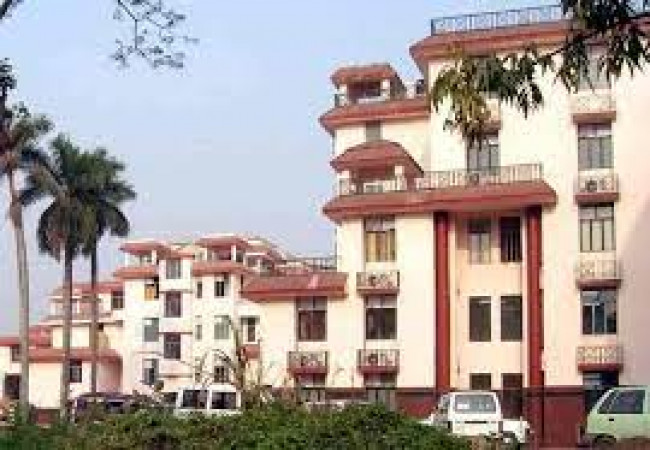Dispur Travel Guide
Dispur, the capital of the northeastern state of Assam in India, holds historical significance as it was declared the capital in 1973. Known for its lush greenery, tea plantations, and rich cultural heritage, Dispur offers a unique blend of modernity and tradition. The city is famous for its vibrant festivals, such as Bihu, which showcases Assamese dance, music, and traditional attire.Top Attractions in Dispur
- Kamakhya Temple
- Assam State Museum
- Guwahati Zoo
- Umananda Island
- Sualkuchi Silk Village
Dispur is Famous for
Tea plantations and Bihu festival.Top Attractions in Dispur
- Explore the Kamakhya Temple
- Visit the Assam State Museum
- Experience wildlife at Guwahati Zoo
- Boat ride to Umananda Island
- Shop for silk products at Sualkuchi Silk Village
What's Great about Travelling to Dispur?
- Experience the rich cultural heritage
- Explore tea plantations and lush green landscapes
- Witness vibrant festivals and traditional dances
What's Not So Great about Travelling to Dispur?
- Limited nightlife options
- Language barrier for non-Assamese speakers
- Monsoon season can affect travel plans
Travel Tips for Dispur
- Check visa requirements before traveling
- Use public transportation or hire a local guide
- Respect local customs and traditions
Important Dispur trip information
- Ideal Duration: 3-4 days
- Best Time to Visit: October to April
- Nearby Airports and Railway Stations: Lokpriya Gopinath Bordoloi International Airport, Guwahati
FAQ's on Dispur
Q1: What is the best time to visit Dispur?
The best time to visit Dispur is during the winter months from November to February when the weather is pleasant and cool. This time is ideal for exploring the city's attractions and enjoying outdoor activities. Avoid the monsoon season from June to September due to heavy rainfall.
Q2: Do I need a visa to travel to Dispur?
Yes, tourists visiting Dispur need a valid visa. Indian e-Tourist visas are available for citizens of many countries, allowing for a stay of up to 60 days. Make sure to check the specific visa requirements based on your nationality before planning your trip.
Q3: What are the must-visit attractions in Dispur?
Some of the must-visit attractions in Dispur include the Assam State Museum, Kamakhya Temple, Umananda Temple, and Assam State Zoo. Don't miss the opportunity to explore the lush greenery of the Assam State Botanical Garden and enjoy a river cruise on the Brahmaputra River.
Q4: Is Dispur a safe place to travel?
Dispur is generally a safe place for travelers. However, like any other city, it is advisable to be cautious of your surroundings, avoid isolated areas at night, and take necessary precautions against petty crimes. Stay informed about any local unrest or demonstrations and follow travel advisories.
Q5: What is the local currency in Dispur and can I use credit cards?
The local currency in Dispur is the Indian Rupee (INR). ATMs are widely available in the city, and major credit cards are accepted at hotels, restaurants, and larger stores. It's advisable to carry some cash for smaller establishments and local markets.
Q6: What is the local cuisine like in Dispur?
Dispur offers a rich culinary experience with traditional Assamese cuisine known for its flavorful dishes, such as Assam tea, fish curries, and bamboo shoot preparations. Don't miss trying the popular Assamese thali that features a variety of local delicacies. Vegetarian and non-vegetarian options are available to cater to different dietary preferences.
Q7: What transportation options are available in Dispur?
Dispur has various transportation options including auto-rickshaws, local buses, and taxis for getting around the city. Car rentals are also available for those who prefer more flexibility in their travel. It's recommended to negotiate fares with auto-rickshaw and taxi drivers before starting your journey.
Q8: Are there any cultural norms or etiquette I should be aware of when visiting Dispur?
When visiting Dispur, it's important to respect local customs and traditions. Modest clothing is advisable when visiting religious sites, and removing shoes before entering temples and homes is a common practice. Greeting people with a "Namaskar" is appreciated, and it's customary to offer and receive items with your right hand. Avoid public displays of affection and be mindful of local sensitivities.
Q9: I am a travel agent. How can I buy travel leads of Dispur?
Register yourself as a travel agent at agents.tripclap.com and then you can buy travel leads to Dispur once your account is approved. For more details contact our support team at +91-8069186564 or support@tripclap.com

